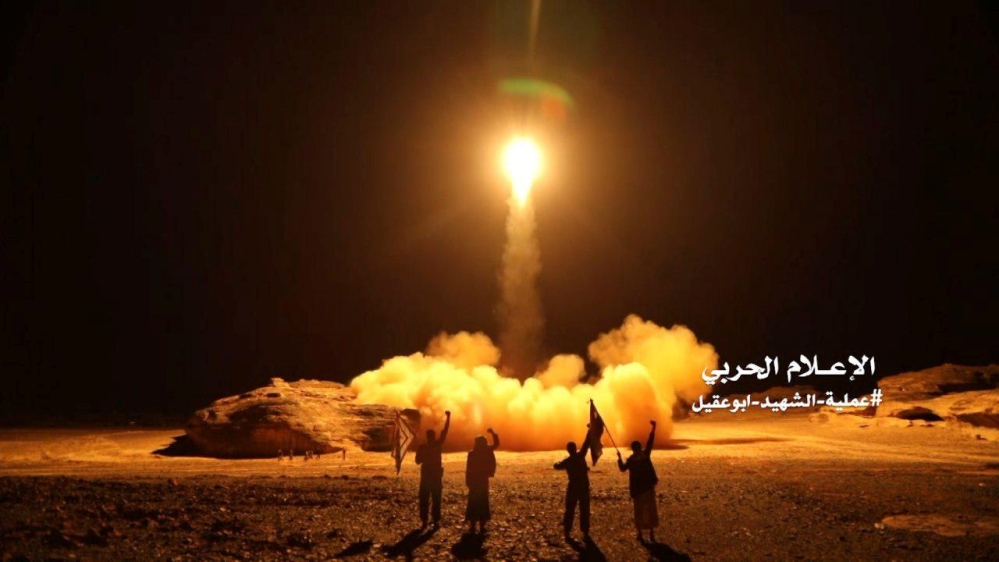Houthis launch attacks on Saudi oil facilities, military sites | Houthis News

Yemen’s Houthi rebels say they have launched attacks on Saudi Arabia, targeting oil facilities owned by state-run Saudi Aramco company and military sites.
The Iran-aligned group on Friday said they launched attacks on Thursday against King Abdulaziz military base in Dammam and military sites in Najran and Asir. The group also said they targeted Aramco facilities in Ras Tanura, Rabigh, Yanbu and Jizan.
According to al-Arabiya TV channel, Saudi Arabia’s air defences intercepted a ballistic missile over the southern province of Najran.
Saudi Arabia has faced an increasing number of such assaults and the tempo has not slowed since it offered a ceasefire deal to the Houthis on Monday.
A Saudi-led military coalition has been carrying out bombings in Yemen since March 2015 in support of the internationally recognised government that was toppled by the Houthis.

The attack in Jizan, some 970km (600 miles) southwest of the capital, Riyadh, on the Red Sea, struck a distribution facility just after 9pm (18:00 GMT) on Thursday, the Saudi Energy Ministry said in a statement carried by the state-run Saudi Press Agency. The Jizan attack was also confirmed by the country’s defence ministry.
“The attack resulted in a fire in one of the terminal’s tanks,” the statement said, without elaborating. “The attack left no casualties.”
Saudi Arabia did not specifically identify the area struck. However, Jizan is home to a new refinery and port facilities for the energy giant, Aramco. The refinery, with a capacity of 400,000 barrels a day, sent its first shipment abroad last year.
Saudi Arabia’s defence ministry said it plans to take deterrent actions to protect oil export facilities following the series of attacks, the Saudi Press Agency reported.
The Saudi-led coalition entered Yemen’s war on March 25, 2015, promising that the offensive – the brainchild of Crown Prince Mohammed bin Salman – would be over in short order.
Six years later, the fighting continues. The war has killed some 130,000 people, including at least 13,000 civilians slain in targeted attacks, according to the Armed Conflict Location and Event Data Project. Tens of thousands of children have died of starvation and disease.
The war has also turned into a regional conflict, with the Saudis using United States-made weaponry in internationally criticised air raids killing civilians, and Iran being linked to weapons used by the Houthis to target the kingdom.
Last month, the Biden administration ended US support of Saudi’s war in Yemen and also suspended the sale of weapons.
Ceasefire proposal
On Monday, Saudi Arabia offered a new ceasefire proposal to the Houthis. It made two concessions to the Houthis in the plan while not offering everything the rebels previously wanted. The first involves reopening Sanaa International Airport, a vital link for Yemen to the outside world that has not seen regular commercial flights since 2015.
The second would see taxes, customs and other fees generated by the Hodeidah port while importing oil put into a joint account of Yemen’s Central Bank. That account would be accessible to the Houthis and Yemen’s recognised government to pay civil servants and fund other programmes, officials said.
The Saudi government and the Yemeni government it backs have accused the Houthis of stealing those funds in the past.
The Houthis said they wanted an end to the Saudi naval and air blockade, and its officials said they wanted both the airport and Hodeidah port reopened without restrictions.
On Wednesday, Saudi Arabia allowed four fuel ships to dock at Hodeidah port in a sign of a softening of its position. The gesture was praised by US Secretary of State Antony Blinken on Thursday. Washington has urged the Houthis to stop targeting Saudi positions and join negotiations to end the war.
The US envoy to Yemen, Timothy Lenderking, has been visiting the Middle East as part of efforts to end the devastating war that has pushed millions towards starvation and left more than 80 percent of Yemen’s population at the mercy of foreign aid.
Ibrahim Fraihat, associate professor in international conflict resolution at the Doha Institute, said the conflict’s escalation in recent weeks is a reflection of internal and regional dynamics where the Houthis and their key backer Iran are trying to enhance their negotiating position ahead of possible peace talks.
“This is important for the Houthis because the way they see it is if they escalate and gain power on the ground, this significantly improves their negotiating position,” Fraihat said.
“In addition to this, there is also the regional dimension, we are seeing a stalemate in negotiations on the nuclear deal with Iran and Iran is trying to escalate on this side because Tehran is demanding that the US lift the sanctions.”

“평생 사상가. 웹 광신자. 좀비 중독자. 커뮤니케이터. 창조자. 프리랜서 여행 애호가.”
